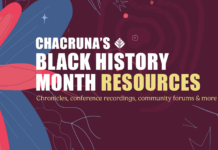- Church of the Celestial Heart Wins Legal Protection for Ayahuasca Use - June 9, 2025
- Press Release – Don’t Miss Chacruna’s Psychedelic Culture Conference, March 29-30 - February 13, 2025
- Press Release – Enrolling Now: “Foundations of Plant Medicine Facilitation, Integration and Ethics” - August 23, 2024

Ali McGhee: Tell us a little bit about yourself and how you got into this work.
Sonya Faber: During Covid, there wasn’t a lot to do for a while. I’m employed in the pharmaceutical industry – I talk to doctors externally about medications – and everything closed down. I couldn’t get into the clinics. I was asked by some colleagues to help them with some of the publication work they were doing in psychedelics and areas like social justice, and I said yes. We worked remotely on several different publications.
AM: Can you share your own journey with psychedelics and psychedelic medicine?
SF: I wasn’t really it first started with these publications, I was asked to help write about Black people and psychedelics. I knew about being a Black person, but not what that means for psychedelics and psychology. When I started reading, I realized there were a lot of things I don’t know about this field I need to educate myself on. I did some deep dives and became more alarmed about the psychology part and not the psychedelics part. There was a basic mismatch between what people of color needed in psychology and what was being provided and studied. What’s going on here? 80% of all psychologists are white and trying to provide therapy to people of color, and they don’t seem to know what they are doing. I decided that no, they don’t know what they’re doing, and what point is there to be talking about psychedelic medicine as requiring some therapeutic dyad when there is no therapeutic basis for that?
80% of all psychologists are white and trying to provide therapy to people of color, and they don’t seem to know what they are doing.
Sonya Faber
AM: How did you begin working with Chacruna? What has that been like?
SF: I was asked by one of my colleagues to come onto the Board of Directors. They said to me, “The board needs people of color. There aren’t very many and we don’t know anyone – and would you do it?”
It’s been good. There are certain things that normally you have to have to be on a board, which I don’t necessarily have. I don’t know super rich donors, for example. It’s interesting to observe how everyone contributes because I’m coming from a very different perspective. That’s one thing that’s very valuable. It’s always a learning experience.
AM: You currently live in Europe. Is your research focused there or in the United States?
SF: The research is mostly coming from the U.S. and Canada / North America but we have some intersections with Europe, because there are a couple of research papers focused on race and racialization in Europe. Europe has some of the same issues – not exactly the same, but similar.
Find more information on the upcoming Psychedelic Culture Conference.
AM: There is a hesitancy and lack of receptiveness to psychedelics for many people of color, especially those who have been historically oppressed – and that same population is now often excluded in current research when it’s actually vital for them to be a part of. Can you say more about this challenge?
SF: Black individuals in the U.S. have lower issues with substance abuse than white people, and people like to think it’s the other way around. Black people want to stay far away from anything they think might be stigmatizing in terms of illicit use of drugs or medications and because they are punished more for partaking in anything that might seem like it’s not “kosher” – there is stigma against it in the Black community. And the fact that [psychedelic-assisted therapy] also requires a therapist … I don’t know a lot of Black people who would trust a white therapist.
MAPS asked my colleague to come and be a part of their study because they realized they didn’t have any therapists of color on their staff. That’s the reason she came on board. But you can’t change the entire profession in a couple of years. People have to be trained and hired and go out into the field. That hasn’t changed dramatically. What has changed is the awareness. And that doesn’t really solve the problem.
AM: What are your hopes for psychedelic therapy and access to psychedelic medicine for BIPOC folks?
SF: They don’t necessarily want to go to a white therapist. The DSM [Diagnostic and Statistical Manual of Mental Disorders], which describes all of these different disorders, has no code for racial trauma. There is nothing. And most people racialized have some racial trauma. So what happens when you go into psychotherapy is repressed trauma tends to come out. When you have people going into this space things related to the trauma of being racialized will come up, and there is not enough cultural competency on the part of people doing this work. People get even more traumatized because the therapists cause more trauma. For Asian people it’s the same thing. A client may say, “There are two tigers fighting within me. and one is Malaysian, the other one is white, and I don’t know which one will win.” And the therapist doesn’t know what to say because they have no cultural competency to guide the client.
You don’t have to be a person of color to have clients of color, but I think white people are socialized to either ignore, dismiss, or avoid the issue of race and racialization. That means it is very difficult for them to catch up to be able to do this work in the way that needs to be done.
You don’t have to be a person of color to have clients of color, but I think white people are socialized to either ignore, dismiss, or avoid the issue of race and racialization. That means it is very difficult for them to catch up to be able to do this work in the way that needs to be done.
Sonya Faber
AM: Can you share a bit about the importance of mentorship and teaching in your life?
SF: Mentoring is unfortunately not a well-done art in general. And people who are in academia hold up their research, while teaching is second fiddle. For me, it’s not about strictly mentoring or teaching per se, but rather helping the people you come across in your life. I don’t have the resources to mentor or teach everybody, but as you are put in positions where you can actually help – and you can choose to help or not – I have chosen to help people put in my way and it’s been very valuable. It’s a sacrifice but you do it to give back.
AM: You have an article under review in Frontiers in Sociology: Race and Ethnicity, “An analysis of divisions of power in a Board of Directors: Power hoarding in the implementation of a DEI committee.” Can you share a little bit about that piece and what you learned researching the topic?
SF: In the last five years, organizations have decided they need to put diversity and equity committees on their boards, and that process has been very fraught and very unsuccessful. This is a case study of an unsuccessful implementation of a diversity, equity, and inclusion board and why it failed. We are trying to share why it failed and point to our reasons so that when others inevitably start to fail, they can refer to this and learn how to prevent it from happening from the very start.

Discover the Indigenous Reciprocity Initiative of the Americas
AM: You and Bia Labate, Executive Director of Chacruna, are working together on a special issue. What is the special issue focused on?
SF: It’s a special issue on power. It’s very interesting, because we’ve had a call out for papers on power and discrimination, and have had a very broad range of submissions. We’ve asked for things specifically on policy weaponization. The big picture issue comes down to policy. That’s where the rubber hits the road. It sounds boring but that’s where it’s make or break. By the stroke of a pen, people’s lives can be transformed. Policy is a place of power, and I want to study it because most things that have to do with power are hidden behind a wall or out of sight. A lot of these things are secret.
Policy is a place of power, and I want to study it because most things that have to do with power are hidden behind a wall or out of sight. A lot of these things are secret.
Sonya Faber
AM: Can you highlight some of your favorite research/publications?
SF: I have two papers I’m the most proud of. The first is “Lions at the Gate: How Weaponization of Policy Prevents People of Colour from Becoming Professional Psychologists in Canada.” It drills down into clinical psychology as a profession and really goes into why. There used to be discrimination and segregation legally. Laws that said as a person of color you can’t study here or go there. Those were repealed and changed as the Civil Rights Movement picked up steam so overt racism became stigmatized. So now people have to be very vague but are saying the same things. Now it’s with policies. Before we were overtly racist, and now we have changed to say “You can’t do these things” that maybe only people of color do or say. And then you can discriminate without seeming to. It’s all done with policy, and cleverly done. The paper pulls out these policies that prevent people of color from becoming psychologists and therefore keep the profession very white and also in power. It’s about Canada but it could be about the States – It’s about how it’s been done, and how to change it.
That dovetails with the DEI committee paper, because how do you take and hold power and prevent others from having it in a way people cannot see or notice it? These issues are important, and they fly under the radar.
AM: How can white people be good allies to people of color?
SF: Anti-racist work on yourself. That’s probably the best way. Then, we have written several guides, manuals, instructions, manuals, and exercises to do to increase your ability to be an ally, but mostly it requires wanting to do this work. It’s not easy and might be painful. Then, taking a hard look at how we live and what that means.
I was recently talking to a couple of German friends about an interesting article in the New York Times on immigration. And it said immigration is broken on purpose, because the U.S. relies on this cheap labor to come in and do this work. Although we could check whether people have the ability to be employed, we don’t on purpose because if we did it would result in a massive problem in the labor force. Also the fact that there is a cheap labor force keeps legal people working for minimum wage. There is someone else working for less. But we choose not to change the system and we profit individually from that system. We go out in our trucks and look for Mexican people and ask them to take care of our lawns. We rely on cheap babysitting. And not doing that would have a cost. In theory we want to be just and fair, and want to live in a just and fair country. We want to make sure this exploitation does not occur, but in reality we are profiting from the exploitation. People have advantages for being privileged, and they don’t want to have them but they do because it will lessen their suffering. We find ways to be unethical in our lifestyle and excuse it. We don’t need to look far to figure out why people of color might be suspicious and not trust going into a room with somebody and telling them about their lives.
Art by Mariom Luna.

Shop our Collection of Psychedelic T-Shirts.
Take a minute to browse our stock:
Did you enjoy reading this article?
Please support Chacruna's work by donating to us. We are an independent organization and we offer free education and advocacy for psychedelic plant medicines. We are a team of dedicated volunteers!
Can you help Chacruna advance cultural understanding around these substances?

















